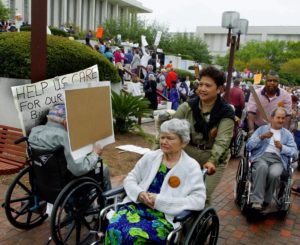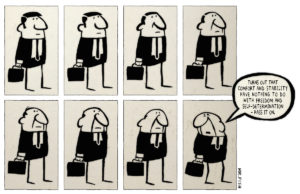Report: Americans Over Age 65 Are More Likely to Share Fake News
Age is a better predictor than gender, income, race or party affiliation in the sharing of false news stories on Facebook. Book Catalog / Flickr
Book Catalog / Flickr
Americans over age 65 are four times more likely to share articles from suspected fake news domains than those ages 18 to 29, according to a new study published in Science Advances. The study found that overall, sharing fake news sites is “a relatively rare activity,” although, as The Guardian observes, “American Facebook users over 65 shared nearly seven times as many articles from fake news domains as those aged between 18 and 29.”
Age is the biggest predictor of whether a person will share fake news online and, according to researchers from Princeton and New York University, the practice is most prevalent among older generations, regardless of gender, income or race.
“In fact,” as The Verge points out in its coverage of the study, “age predicted their behavior better than any other characteristic—including party affiliation.”
The impact of fake news on election outcomes has been widely debated, making it difficult for researchers to develop a consensus on whether and how such stories influence voter behavior, or to quantify the extent of their reach. One study, by the Comparative National Elections Project at Ohio State University, suggests that approximately 4 percent of Barack Obama’s supporters in 2012 voted for Donald Trump in 2016 due to false stories. Another study by researchers from Dartmouth and Stanford, published in the Journal of Economic Perspectives, shows that just 10 percent of Americans made approximately 60 percent of the visits to fake news sites.
The most recent study analyzed the Facebook habits of 1,750 American users just after the 2016 election. Participants installed an application that shared data with the researchers, including public profile fields, religious and political views, what they posted to their own timelines and the pages they followed. Researchers cross-referenced the links participants posted with a list of suspected fake news sites compiled by BuzzFeed reporter Craig Silverman.
Researchers later checked those links against four similar lists for consistency. Just 8.5 percent of those surveyed shared at least one link to a domain associated with any of the lists of fake news sites.
Among that group, participants age 65 and over shared the most fake news stories.
The authors did not draw a firm conclusion as to why older users share more fake news, but they suggested two ideas for further testing. One is that people experience cognitive decline, including memory loss, as they age, which may make them more susceptible to hoaxes. Another is that older people are more likely to have begun using the internet later in life, and perhaps lack internet literacy:
As the largest generation in America enters retirement at a time of sweeping demographic and technological change, it is possible that an entire cohort of Americans, now in their 60s and beyond, lacks the level of digital media literacy necessary to reliably determine the trustworthiness of news encountered online.
Within this cohort, lower levels of digital literacy could be compounded by the tendency to use social endorsements as credibility cues. If true, this would imply a growing impact, as more Americans from older age groups join online social communities.
Authors of the NYU-Princeton study indicate that they hope to test both hypotheses in the future.
Matthew Gentzkow is a senior fellow at the Stanford Institute for Economic Policy Research who studies Facebook’s attempts to stop fake news. He told The Verge that this study might be helpful for developing tools to prevent elderly Facebook users from falling victim to various internet scams. “The age result in this paper points very directly toward at least narrowing down the set of solutions that are likely to be most effective,” he said.
Your support matters…Independent journalism is under threat and overshadowed by heavily funded mainstream media.
You can help level the playing field. Become a member.
Your tax-deductible contribution keeps us digging beneath the headlines to give you thought-provoking, investigative reporting and analysis that unearths what's really happening- without compromise.
Give today to support our courageous, independent journalists.









You need to be a supporter to comment.
There are currently no responses to this article.
Be the first to respond.